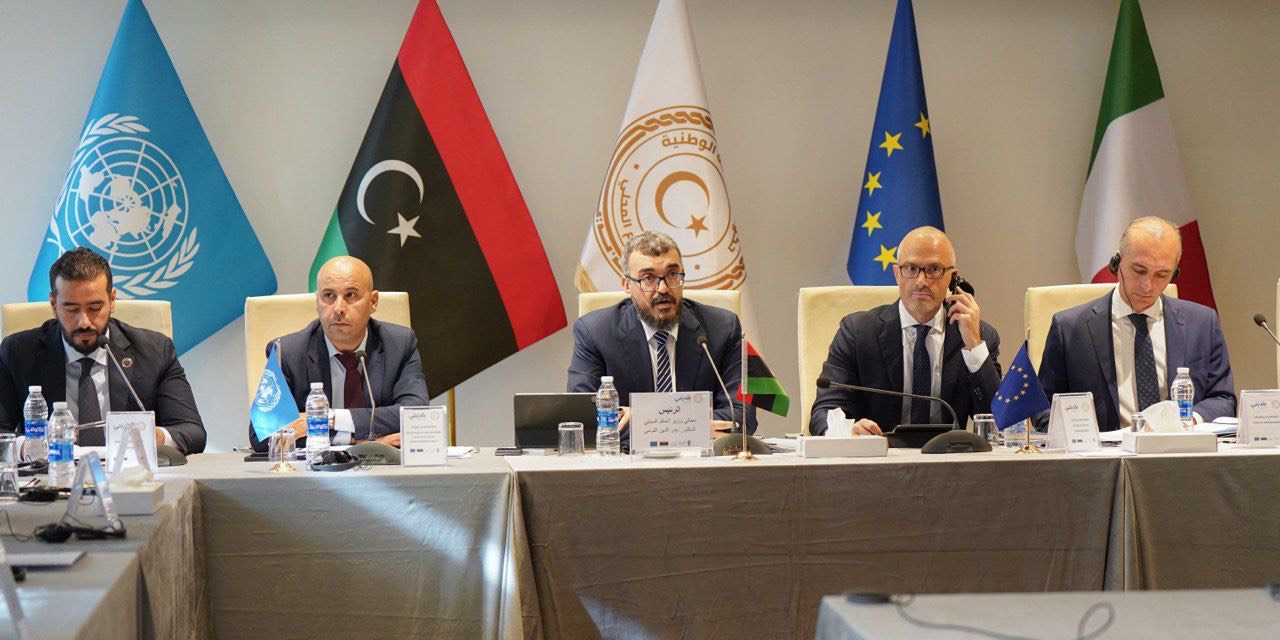The Ministry of Local Government, the Ministry of Planning, EU, AICS, UNDP and UNICEF, met at the 7th Steering Committee meeting of the Baladiyati programme.
Baladiyati, the EU funded Programme, held its 7th Steering Committee meeting in Tripoli
November 21, 2024

The 7th Steering Committee of the European Union funded Baladiyati programme
Tripoli, 21st November 2024 - Today, the Italian Agency for Development Cooperation (AICS), the United Nations Development Programme (UNDP), and the United Nations Children's Fund (UNICEF) presented key progress and achievements at the 7th Steering Committee meeting of the "Recovery, Stability and Socio-Economic Development in Libya - Baladiyati" programme, held in Tripoli.
Since 2018, the €76.2 million Baladiyati programme, funded by the European Union through the Emergency Trust Fund for Africa, has worked to enhance stability and improve living conditions for vulnerable communities across Libya. With over 700 priority interventions completed in 40 municipalities, impacting more than 3 million people, the programme empowers local authorities to deliver essential services—including education, healthcare, water, sanitation, and sustainable energy. In addition, Baladiyati promotes social cohesion, supports local peacebuilding initiatives, creates new livelihood opportunities, and strengthens community resilience.
Today's event brought together the institutional representatives of the main partners of this initiative, which included the Minister of Local Governance, H.E. Badr Eldin Sadig Altoumi; the Deputy Minister of Planning, Mohamed Aboshriaa; the Ambassador of the European Union to Libya, H.E. Nicola Orlando; the Ambassador of Italy to Libya, H.E. Gianluca Alberini; representatives from AICS, UNDP, and UNICEF.
During the event, the Steering Committee reviewed the progress of the second phase of the programme, which began in June 2021 and focuses on Southern Libya. As the programme enters its final stage, 80% of the total 401 planned interventions have been completed across 21 municipalities, with the remaining activities ongoing and expected to conclude by the first quarter of 2025. 159 public key infrastructures have been upgraded, benefiting 552,490 people, while reaching 33,604 individuals through awareness-raising activities on basic rights. Additionally, 950 staff from public sector entities, civil society organizations, and private service providers have received training, building local capacities. The programme has also created income-generating opportunities for 9,250 residents through grants, asset provision, and capacity-building activities. Aligned with its goal to strengthen the local social fabric, Baladiyati has organized social cohesion awareness events, benefiting 10,000 individuals, 353 of whom received specialized training to promote community integration and resilience.
The Steering Committee expressed gratitude to Libyan local and central authorities, as well as implementing partners, for their close cooperation and sustained engagement. The Minister of Local Governance, H.E. Badr Eldin Sadig Altoumi, extended appreciation for the support provided by the European Union, AICS, UNDP, and UNICEF to Libyan municipalities: “The successes of Baladiyati in enhancing basic services across our municipalities are a clear reflection of the fruitful cooperation between Libya and its international partners. Through the development of infrastructure, the strengthening of water services, and the empowerment of local communities by supporting small enterprises, we are making significant progress in improving the lives of Libyan citizens.”
Mohamed Aboshriaa, Deputy Minister of Planning, expressed great appreciation for the tangible achievements of the Baladiyati programme in advancing stability and development in Libya. He explained: "The Ministry of Planning supports this vital project, which enhances the capacity of municipalities to deliver effective services to citizens, contributes to local capacity-building, and supports youth entrepreneurship."
H.E. Nicola Orlando, the Head of the European Union Delegation to Libya, emphasized the significance of the programme and its positive impact on Libya: “Baladiyati is one of the most effective EU-funded initiatives to strengthen local institutions and foster inclusive development across Libya, in alignment with the decentralisation strategy of the government. Coordinating closely with the vision of the ministry of local governance, the European Union is particularly committed to enhancing the living conditions and resilience of communities in Southern Libya and in municipalities facing challenges in providing essential services.”.
The Italian Ambassador in Libya, H.E. Gianluca Alberini, reiterated Italy's commitment to strengthen cooperation for stability and improved welfare across Libya: " The partnership between Italy and Libya remains steadfast. Our partnership, reinforced by the recent Business Forum, is rooted in mutual respect and a shared vision for a peaceful and prosperous future. Together, we will continue to strengthen local governance, support sustainable development, and enhance the lives of the Libyan people."
AICS Deputy Regional Representative, Ms. Annamaria Meligrana, emphasized the Italian Cooperation's commitment to supporting local governance and enhancing essential services for the Libyan population: “Today, we celebrate the positive impact of Baladiyati’s achievements, and look ahead to further strengthening this foundation—particularly in light of the recent Memorandum of Understanding on development cooperation between Italy and Libya, a significant milestone for future collaboration.”
“Baladiyati is a testament to the resilience and strength of Libyan communities. Together with local partners and targeted support we are building foundations for peace and stability beyond infrastructure— strengthening communities, empowering individuals, and fostering an inclusive future.” stated UNDP Resident Representative, Ms. Sophie Kemkhadze.
“Through the Baladiyati programme, UNICEF has supported Libya's youth by establishing youth clubs and offering life skills and entrepreneurship trainings. UNICEF has also developed Life Skills Manuals and a Youth Employability Study to create more opportunities for young people. This work is a result of our close partnership with the Ministries of Local Governance, Youth, and Education, working together to build a better future for Libya’s youth.” expressed UNICEF Representative to Libya, Mr. Mohammad Fayyazi.
For media inquiries and further information, please contact:
Annachiara Antinelli, AICS Communications Officer: annachiara.antinelli@aics.gov.it
Lilah Gaafar, UNDP Communications Analyst: lilah.gaafar@undp.org
Aml Barghuti, UNICEF Communications Officer: aalbarghouti@unicef.org

 Locations
Locations



